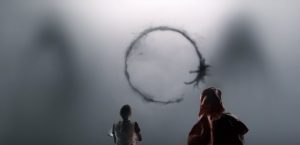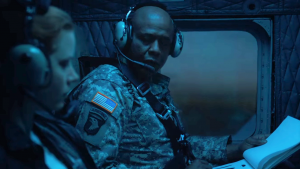
We fear change. Anything that presents a disruption to the fabric of our being causes apprehension. Some take to this fear with anger and hostility, lashing out and rejecting a possibly positive progression in favor of the comfort of complacency. Others’ fear is driven by the past, the failings and damages done by similar progressive views prompting a belief of the same happening again. Then there are those who take that fear and craft curiosity from it, welcoming the change as a way of moving forward. They understand the severity the change represents, but are hopeful it’s for the best. All of these fears are mined from a common thread: life.
We cherish life all the while fearing it. We know with life comes death, with triumph comes heartache. We focus more on the latter, our personal regrets overcoming our psychosis to the point of no return. We fail to bask in the triumphs as our interminable desires overwhelms our senses. We are never happy with what we’ve got, always in search for a greater good. For all of us, the greatest good would be to turn back time and right our wrongs. We know that is impossible, at least in our linear timeline.

Change manifests itself in the form of extra-terrestrials in Denis Villeneuve’s “Arrival.” Their arrival is sudden, causing an uproar in the world that is reminiscent to the aftermath of a tragedy. People flock the streets in horror, trampling and crashing into one another in search of security. Not even a few days into the arrival and the public is demanding answers from the government, an unfeasible request. As we traverse through the secretive government investigations, we are given fleeting glimpses of the outside world in the form of newsreels, personal phone calls, and social media outrage. We see and hear the fear in the hearts of many, automatically assuming the worst simply due to a lack of understanding. An alien being is immediately perceived as a threat as it doesn’t conform to our fabric of being. Even when the aliens lie dormant, the fear of impending doom remains.
Those previously mentioned reactions to change are all represented in the film’s investigators. Dr. Louise Banks (Amy Adams) represents curiosity, a linguist deciphering their language to communicate and make peace for a better tomorrow. Ian Donnelly (Jeremy Renner) is a scientist more fascinated by the reasoning for their arrival, immediately seeking scientific analysis over communication. Agent Halpern (Michael Stuhlbarg) worries of an imminent war, not wanting to take any chances that threats may be nothing more than peace offerings lost in translation. Colonel Weber (Forest Whitaker) is the ringleader, bringing all three combustible elements together to decide on a conclusion. All of them are driven by their humanity; a desire to garner a result that benefits the needs of the many. It is their approach to change that defines them.

Dr. Louise Banks is our avatar, a broken soul looking for redemption. We see in the opening scene a montage of life and death that rivals the heartbreaking poignancy of Pixar’s “Up.” She brings forth the gift of life, only to have it ripped away from her in a fleeting second. She has gone through life despondent, with the alien arrival acting as a new lease on life. Had her daughter still been alive, there’s little doubt she’d be retreating and/or retaliating out of threat. With nothing left to lose and compassion to be restored, she seeks acceptance and guidance from the visitors.
The aliens are nothing more than a metaphor for change. They exist to give the characters motivation and provide a prodigious threat, but at their core they are nothing more than a manifestation of change. Their octopus-like frames, with tentacles that spew ink to spell out their language and a body frame reminiscent of a giant hand, serve as an abnormality to trigger the senses. Both their lack of sufficient communication and idiosyncratic appearance drum up a fear of the unknown, exactly what a figurative change brings about. While their appearance boasts danger, they never cause it. It is the fear they infuse into society, intentional or unintentional, that causes damage. Society revolts in panic, causing riots, looting, and war. In a time desperate for unity, consternation breeds hostility instead.

Those who don’t live in fear of change are given a second chance. Said chance may not result in the happiness one is in pursuit of, but the attempt brings about hope. A hope for love, compassion, and civility. Under the film’s sci-fi coating resonates a deeper meaning of life, akin to Terence Malick’s vision in “The Tree of Life.” Those in search for common sci-fi tropes and extravaganza will be sorely disappointed. Those in search of a high-minded dissection of humanity will be greatly pleased. There is a happy medium, the marriage between the two a comfortable one. The twist is what will bring about a great divide, one I hope causes discussion and not conflict.
My only complaint is that the film is a tad too short. An extra ten minutes or so would’ve gone a long way in allowing a few key sequences to simmer, as opposed to a narrative exposition dump in the face of immediacy. Even I must attest to the brilliance of this, though, as it complements the immediacy of the situation. It is the minutest of complaints, one that will be nothing more than a distant thought in this film’s lasting power. I must accept that beggars can’t be choosers.

No matter, as “Arrival” is a brilliant piece of cinema! It embodies what great art does, a challenge to the mind and senses. It sits comfortably in Villeneuve’s filmography of excellence, complementing the harsh humanity of “Prisoners” and “Sicario” and the psychology of “Enemy.” Ted Chiang’s story, “Story of Your Life,” is the perfect fit for Denis’ style, with screenwriter Eric Heisserer adapting it swimmingly! All facets of humanity at work on this film came together to create a beautiful masterpiece; fitting considering the message of this film!
Final Rating: A
